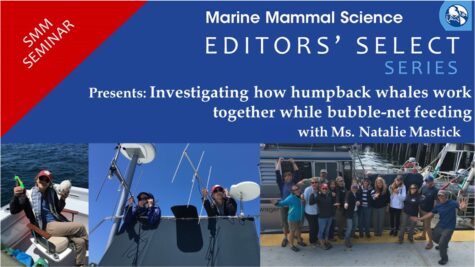
This series highlights the latest and most exciting marine mammal science published in the Marine Mammal Science Journal. The SMM created this series to give scientists and citizens around the world a chance to engage with marine mammal scientists, learn and ask questions. All are welcome.
Join us on Thursday, 19 January 2023 at 3 PM PST / 6 PM EST / 11 PM GMT
for the next SMM Seminar Editors’ Select Series:
Investigating how humpback whales work together while bubble-net feeding
with Ms. Natalie Mastick
This event is free to attend and presented online via Zoom, but registration is required.
Register here: https://us06web.zoom.us/webinar/register/WN_kNoCxVnBTFmrXO0uO_nBAg
Space on Zoom is limited to the first 500 attendees. The talk will also be streamed live on the SMM Facebook page.
About this talk:
In this study, Natalie and her co-authors tagged 26 bubble-net feeding whales and assessed differences in dive patterns between groups of various sizes. They found that whales participating in bubble-net dives adopted one of six dive strategies. More complicated dives were usually used in small groups. One dive type, the upward spiral, was malleable (it could have different numbers of rotations,) and was used across all group sizes. The authors also looked at whether the dive strategies changed based on the number of whales in the group. There were no differences in the strategies based on group size except when whales used an upward spiral strategy. The upward spiral technique changed based on how many whales were feeding together, suggesting that whales needed to maneuver less, and potentially work less, to effectively herd the prey to the surface. This finding shows that working together may benefit the whales by decreasing the amount of energy they expend to feed.
About the presenter:
Natalie is a marine ecologist with a research focus on marine mammal behavior, foraging ecology, and parasite ecology. She is a PhD Candidate in the Wood Lab in the School of Aquatic and Fishery Sciences at the University of Washington, and a Graduate Research Fellow with Oceans Initiative. For her PhD, she is studying the change in risk of parasite infections in marine mammals. Natalie is also a founding member and Research Associate with Sound Science Research Collective, where she researches humpback whale behavior in Southeast Alaska. Natalie received her B.S. in Marine Biology and B.A. in Environmental Studies at the University of California, Santa Cruz, and her M.Sc. in Wildlife Science at Oregon State University.
Open access to all Marine Mammal Science papers is available to current SMM members. Open access to this article is made temporarily available to the public in the weeks around the presentation and can be found here.
Missed a presentation or want to share this series with a friend? All previous Editors’ Select presentations are recorded and archived on our YouTube channel here: https://www.youtube.com/playlist?list=PLUc78IynQlubS2DVS1VZoplf_t42-yZOO